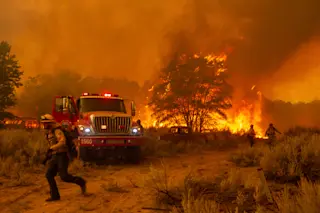On Sunday, this blog received an instructive (and anonymous) comment that accidentally landed in the spam folder. It's from someone who works in U.S. state government on water-related issues (likely in the West). The comment is part of this thread, which was lively until all the typical jousting and preening by combatants overwhelmed it. I'm featuring the comment as a stand-alone post because it offers an unvarnished perspective of someone on the ground level of government, who is positioned at the intersection of science and policy.
I work in state government on water resources management. I interact a fair amount with federal and other state officials regarding climate change mitigation and adaption policies. Executive government, in this country and elsewhere, is focused, nearly exclusively, on issues of AGW adaptation and mitigation. Much of the debate I observe on this and kindred blogs is no longer that relevant to this work. ...













